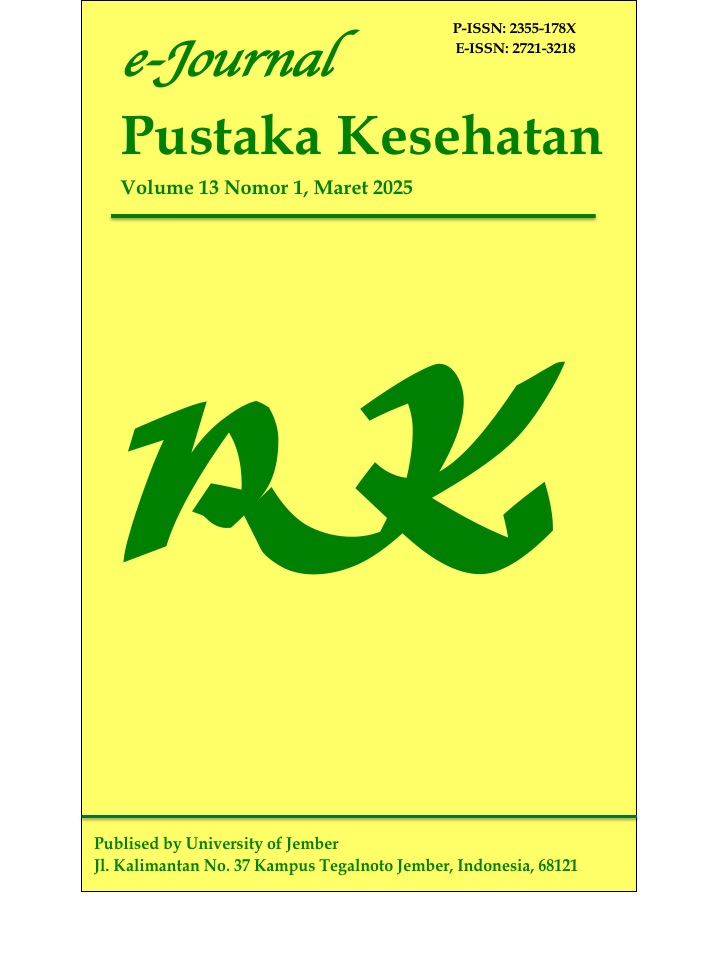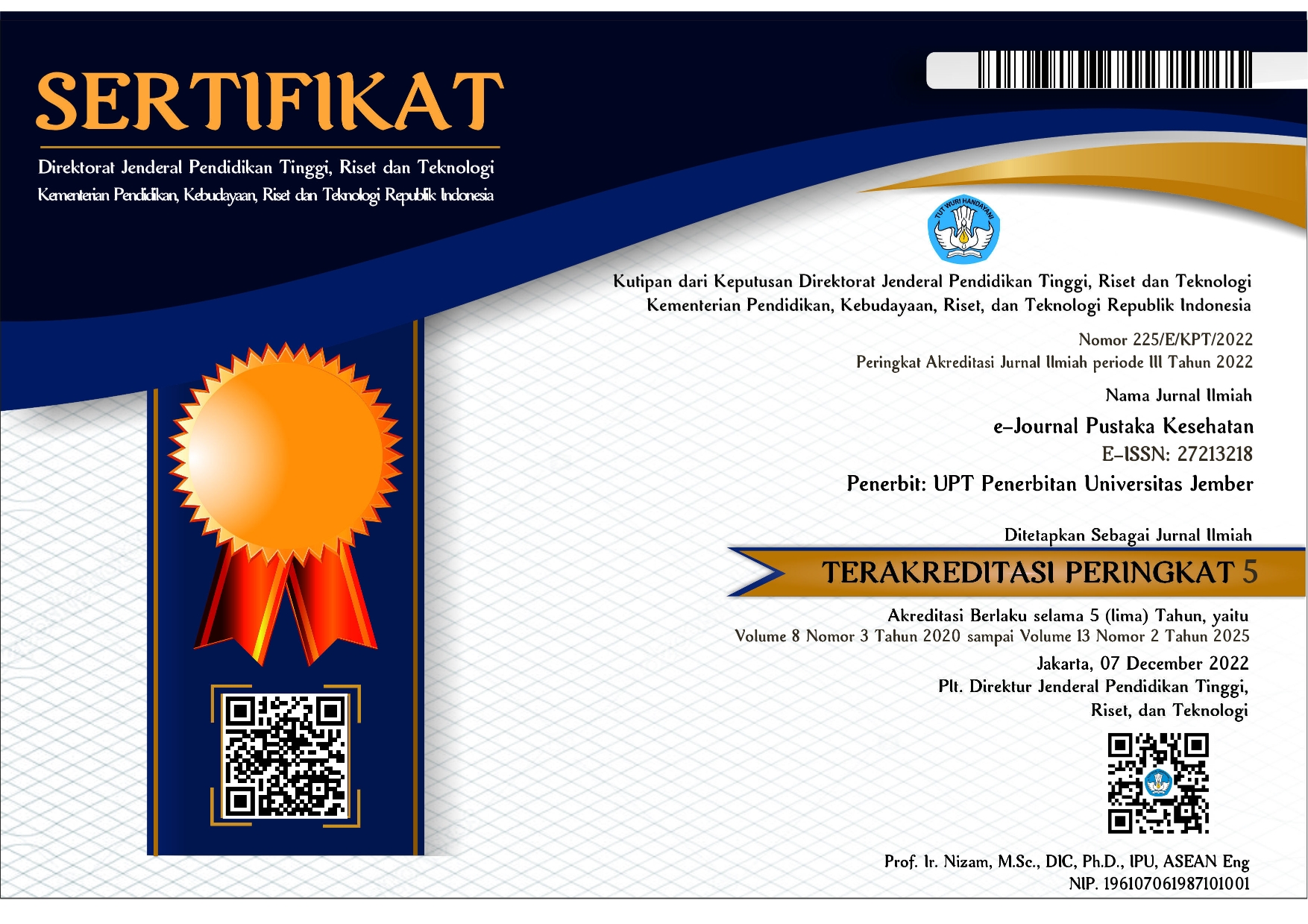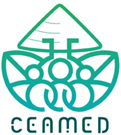Analisis Risiko Kesehatan Lingkungan Pajanan PM10 Di Lingkungan Pertambangan: Studi di Dusun Kapuran Gunung Sadeng, Jember
Keywords:
environmental health risk analysis, mining, particulate matterAbstract
Air pollution increases with city development, which leads to an increase in domestic and industrial activity, including an increase in particulate matter 10 (PM10) pollutants. Kapuran is located less than 20 meters from the limestone mining industry, where the community is potentially exposed to pollutants, especially PM10. This was an observational descriptive study to analyze the health risk of people in Kapuran. The study used 63 respondents who lived in Kapuran. Data were collected by interviews and direct measurements of air samples, which were taken at 6 locations, i.e., 3 locations at community residential areas and 3 locations at the main road of community access and mining vehicles. Air sampling is carried out for 1 hour at each location. The PM10 air measurements are at a minimum of 0.060 mg/m3 at the first location and a maximum of 0.091 mg/m3 at the third location. The PM10 exposure is at a maximum of 0.0173, indicating an unsafe limit. The risk characteristics (RQ) calculation showed there were 11 respondents who had an RQ value of more than 1, meaning an unsafe health risk.
Downloads
References
[1] Herlina MFKO. Air Pollution CISDI Report 2021. Laporan Dan Analisa Pencemaran Udara Di Indonesia, 2021.
[2] Sembiring, ETJ Risiko Kesehatan Pajanan Pm2,5 Di Udara Ambien Pada Pedagang Kaki Lima Di Bawah Flyover Pasar Pagi Asemka Jakarta. Jurnal Teknik Lingkungan, 2020;26(1): 101–120. https://doi.org/10.5614/j.tl.2020.26.1.7
[3] Budhyanti W, Lisnaini, Chandra M. Penanganan Infeksi Saluran Pernafasan Atas (ISPA) Pada Anak. 2021. Universitas Kristen Idonesia.
[4] Soemirat J. Analisis Risiko Kesehatan Lingkungan. 2013. Yogyakarta: Gadjah Mada University Press.
[5] Sugiyono D. Metode Penelitian Kuantitatif, Kualitatif, dan R & D. 2013. Pnerbit Alfabeta. Bandung.
[6] De Donno A, De Giorgi M, Bagordo F, Grassi T, Idolo A, Serio F, et al., Health risk associated with exposure to PM10 and benzene in three Italian towns. International Journal of Environmental Research and Public Health, 2018: 15(8): 1–13. https://doi.org/10.3390/ijerph15081672.
[7] WHO, WHO global air quality guidelines. 2021.
[8] Notoatmodjo S. Metodologi Penelitian Kesehatan. 2018. RINEKA CIPTA. Jakarta.
[9] Sooktawee S, Kanabkaew T, Boonyapitak S, Patpai A, Piemyai N. Characterising particulate matter source contributions in the pollution control zone of mining and related industries using bivariate statistical techniques. Scientific Reports, 2020;10(1): 1–10. https://doi.org/10.1038/s41598-020-78445-5
[10] Wahyuni EDYH, Setiani O. Analisis Risiko Kesehatan Lingkungan Gas Karbon Monoksida Pada Pedagang Kaki Lima (Studi Kasus Jalan Setiabudi Semarang). Jurnal Kesehatan Masyarakat (e-Journal), 2018; 6(6),:87–93.
[11] Rykowski R, Brochu A. Diesel Particulate Emissions: The Unites States, Europe and Japan.2018;11(1): 1–62. https://nepis.epa.gov/Exe/ZyPDF.cgi/94003XYX.PDF?Dockey=94003XYX.PDF.
[12] Kementerian Kesehatan Direktorat Jenderal PP dan PL: Pedoman Analisis Risiko Kesehatan Lingkungan (ARKL). 2012.
[13] Hidayat A, Inaku R, Novianus C. Pengaruh Pencemaran Udara PM 2 , 5 dan PM 10 Terhadap Keluhan Pernapasan Anak di Ruang Terbuka Anak di DKI Jakarta The Effect of PM 2 . 5 and PM 10 Air pollution on Complaints of Children ’ s Respiration in Children ’ s Open Space in DKI Jakarta. 2020;5: 9–16.
[14] Pamungkas ER, Sulistiyani, Raharjo M. Analisis Risiko Kesehatan Lingkungan (Arkl) Akibat Paparan Karbon Monoksida (Co) Melalui Inhalasi Pada Pedagang Di Sepanjang Jalan Depan Pasar Projo Ambarawa Kabupaten Semarang. Jurnal Kesehatan Masyarakat (e-Journal), 2017;5(5): 824–831.
[15] Budiyono A. Pencemaran Udara : Dampak Pencemaran Udara Pada Lingkungan. Dirgantara, 2010;2(1): 21–27.
Downloads
Published
Issue
Section
License
Copyright (c) 2025 R Moh Dimas Maulana, Khoiron Khoiron

This work is licensed under a Creative Commons Attribution-ShareAlike 4.0 International License.
e-Journal Pustaka Kesehatan has CC-BY-SA or an equivalent license as the optimal license for the publication, distribution, use, and reuse of scholarly work. Authors who publish with this journal retain copyright and grant the journal right of first publication with the work simultaneously licensed under a Creative Commons Attribution-ShareAlike 4.0 International License that allows others to share the work with an acknowledgment of the work's authorship and initial publication in this journal.







